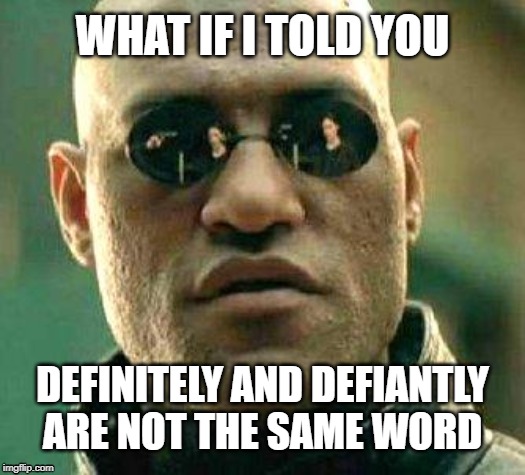Welcome to blog post number two! In this edition, we’re going to explore some important, commonly confused words that are forever tripping us up on social media.
Contents:
Advice and Advise
How many times has someone wanted you to take their advise? The correct word here is advice. While these two words stem from the same word, they are definitely not interchangeable.
Advice is a noun and refers to a recommendation of a course of action to a situation:
- Take my advice and move out of home
- If you want my advice, you shouldn’t have broken up with him via text message.
Advise is a verb and refers to the action of giving advice:
- I wouldn’t advise taking the lift during the fire drill
- Jill was ill advised when her friend Sharon told her to break up with her boyfriend via text message.
With these two, take note of the different pronunciation. Advice is pronounced like ice on the end of it, whereas Advise has an eyes at the end.
Want more advice? Okay, listen up:
- Advice – has a C – just like the word vice, and is pronounced as such.
- Advise – has an S – just like the word visor, and is pronounced as such.
Think of these two words if ever you get confused! 🙂
I adviced him to come to the party. No, you advised him to come to the party.
To recap: Because Tom wasn’t feeling well after being dumped via text message, his doctor advised him to stay at home and rest. Tom took his advice.

Loose and Lose
When something is loose, it means it’s not being held together properly and most likely needs fixing, or it could also mean something is not restrained.
- My mate got canaried by the cops for having his exhaust too loose
- I daren’t tell my parents I had a loose tooth cause they’ll pull it out!
- Train your dog to walk on a loose lead.

Lose has two meanings:
- To not win:
I want Brisbane to lose against the Hawks. - To not know where something is:
Don’t lose your spare key again!
Once again, pronunciation is key with this one:
Loose is pronounced like Moose, or Noose, or Truce.
Lose is pronounced like Blues, Clues, and Muse.
Another thing to note is that the past tense of lose is lost:
- Brisbane lost against the Hawks
- I lost my spare key – again
There is, however, no past tense of loose; there is only loose, looser and loosest.
Now that we know that loose and lose are two different words, the same can be said about looser and loser. That guy is a looser. No; that guy is a loser.
Same applies with Loosing and Losing. We’re loosing the match. No; you’re losing the match. In fact, there is no such word as loosing. There’s loosening which is the opposite of tightening, e.g. The carpenter was loosening the screws; but no loosing.
Bought and Brought
Out of all the words that frequently get confused, I would say this takes first place, although Loose and Lose comes pretty close I reckon. Let’s break it down:
Bought: This is the past tense of ‘to buy’, e.g. I bought a pie from the pie shop.
Brought: This is the past tense of ‘to bring’, e.g. I brought a pie from home.
Yes; it’s that easy! If you ever get confused, just ask yourself, did you buy something, or did you bring something?
I’m going to buy Christmas presents for my kids = I bought Christmas presents for my kids.
I’m going to bring my new puppy into work for everyone to see = I brought my new puppy into work for everyone to see.
This was bought to my attention. Nope, it was brought to your attention.
We recently brought a house. Unless you picked it up and relocated it, then nope, you bought a house.
Better still, can you replace the word with purchased? Purchased means the same thing as bought, so if you can swap the word with purchased, bought it is! If you can’t, well then you must mean brought!
- Seeing that animal video on Facebook purchased tears to my eyes.
That doesn’t make sense, therefore it brought tears to your eyes. - I purchased my own snacks from the supermarket and purchased them into the movie theatre.
Well that first one made sense but the second one, not so much. So you bought snacks and then you brought them into the movie theatre. Of course, if you are someone who does this, then smuggled is also a pretty good word choice.
Another potential life hack with this one:
- Bring – Brought
- Buy – Bought
Okay so both Brought and Bought have a u in there, but it’s the Br that makes the difference. Did you bring something? Yes, you brought it. Did you buy something? Yes. Well, it can’t be brought, so it must be bought!
Take a look at this full-page Jeep advert. Where did they bring the Jeep from I wonder?

Definitely and Defiantly
With this one, I’m not sure it’s the meaning of the word that’s the source of confusion; I think it’s just because the two words look the same.
Definitely: This is used when something is definite or certain:
“Are you going to Kate’s party?”
“Yes, definitely!”
Defiantly: This is an adverb (a word used to describe a verb or adjective) and is used when talking about something being done in a defiant manner:
He shook his fist, defiantly.
Let’s look at a sentence which uses both words:
“No, I definitely wasn’t checking out your girlfriend!” Ben said, defiantly.
If something is definite – definitely;
If something is defiant – defiantly.

To be honest, defiantly isn’t really used all that much in this day and age so definitely is most likely the word you mean, but at least you now know the difference.
Passed and Past
Let’s end this blog post on a tough one. You might want to get a cup of tea or coffee for this.
Passed is the past tense of ‘to pass’, i.e. I pass the shops; I passed the shops; I have passed the shops.
- Kim passed me in the library
- The barista passed me my change while I waited for my coffee.
The word pass can also be used in sports: Matt passed the ball to me.
Passed is also used to mean something is successful: I passed my driving test.
When someone has died, you generally say that they have passed away.
Past has a few uses. Generally, it’s referring to something that’s already happened.
As a noun: It’s all in the past.
As an adjective:
- This past week has seen many changes
- The opponents’ past matches.
It can also refer to a former title e.g. a past President of a club.
Past also relates to movement, or going beyond a certain point:
- Don’t go past the haunted house
- The ball sped past the defence line
- Take the turning past the school
- Buddy went past the sea of swirly-twirly gumdrops.
Past is also used when referring to time, e.g. Half past six; Quarter past one.

Now let’s look at the confusion with Passed and Past. I guarantee my handy tip will make it easier for you.
Let’s look at that sentence above. Buddy went past the sea of swirly-twirly gumdrops. Couldn’t you also say Buddy passed the sea of swirly-twirly gumdrops? You sure could. What’s the difference? The difference is that the first sentence has a verb (went) in front of passed. The moment you add a verb in front of passed, convert it to past. For example: ran past; moved past; walked past; sailed past; flew past. Let’s use two examples, using each type of word to see the difference:
- I passed Jack in the hallway; I snuck past Jack in the hallway.
- The girl passed the group of lockers; The girl casually strolled past the group of lockers.
The moment pass is no longer the doing word, it must be past as you can’t have two verbs in a row.*
Let’s look at some incorrect sentences followed by their correct versions:
Incorrect sentences:
- To avoid his mum catching him skipping school, Kevin ran passed the sweet shop
- The office intern ran something passed his manager.
Correct sentences:
- To avoid his mum catching him skipping school, Kevin ran past the sweet shop
- The office intern ran something past his manager.
What’s that, you ask? Oh, did I use an asterisk above? Ah yes, how could I forget? There is one exception to this rule.
*You can’t have two verbs in a row. Except when the verb is have. And when you use have, you use passed, not past. I used the example above: I have passed the shops. Let’s face it: have is barely a verb. A verb is a doing word. Running past, sailing past, zooming past. These are all verbs. Having past? Nup. So you have something. Big deal. That is barely a doing word. Two further examples of something having passed: Eight years have passed since you left us; I have passed on your feedback to management (how many times have we heard this one, by the way?).
That was a lot of information wasn’t it? To finish up, let’s watch this related clip from the hilarious Curb Your Enthusiasm.

